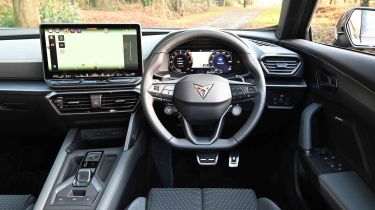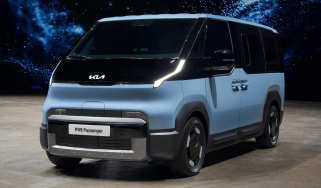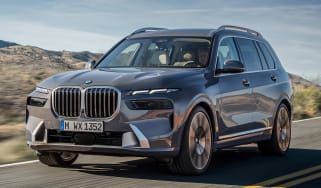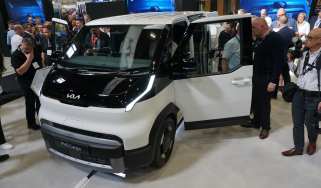Cupra Formentor - Interior, design and technology
The Cupra Formentor has a very nice interior, even if a little too much is shared with the cheaper SEAT Leon
The updated Formentor features the ‘shark nose’ front end of Cupra’s new all-electric line-up, along with new triangular headlights, a neater grille and a completely revised bumper. A full-width light bar brightens up the rear of the car, showing off an illuminated Cupra badge at the centre.
No matter which model you opt for, the Formentor delivers an impactful look, and the sporty flavour is complemented by the driver being able to find a suitably low driving position. The top-spec VZ First Edition and the VZ3 include impressive carbon-backed bucket seats that offer good support and plenty of comfort.
What is the Cupra Formentor like inside?
The Formentor has a much more modern and stylish interior than its Ateca sibling. A huge 12.9-inch central touchscreen is perched on top of the dashboard, and most of the climate controls have been migrated onto the screen to give a cleaner look, much to the detriment of usability on the move.
There’s also a digital instrument cluster that comes as standard, plus a steering wheel with copper detailing and a carbon fibre-effect centre.
What is the interior quality like?
The interior has enough classy touches to lift it above a standard SEAT – especially in either V2, V3, or VZ specification which get a leather-covered dashboard. Look down, and you’ll see a lot of familiar switchgear and the stubby gearlever out of the latest Volkswagen Golf, but overall the interior still feels quite special. You’ll still find some cheaper plastics lower down that don’t quite cut the mustard in a £40,000 car, and we also think that the flappy paddles behind the steering wheel don’t feel premium enough.
Sat-nav, stereo and infotainment
Every Formentor version now features a new 12.9-inch touchscreen. In terms of functionality it’s not a massive step forward, but it’s more intuitive than before, while some bespoke graphics make it feel distinct from other VW Group models. The divisive climate control touch sliders are thankfully now illuminated too.
There are some useful shortcuts on the climate control page, such as a setting to warm your feet, and another to cool the cabin, but we still prefer physical buttons to make things easier to find while you’re driving.
Wireless Apple CarPlay and wired Android Auto smartphone connectivity are both standard thankfully, so you can bypass Cupra’s software for the most part. You get four USB-C ports (two front and two rear) to keep your devices topped up, plus standard wireless phone charging.
A seven-speaker audio system with Bluetooth, and DAB radio is standard across the range, while the VZ3 model upgrades to a ten-speaker arrangement courtesy of Sennheiser.








